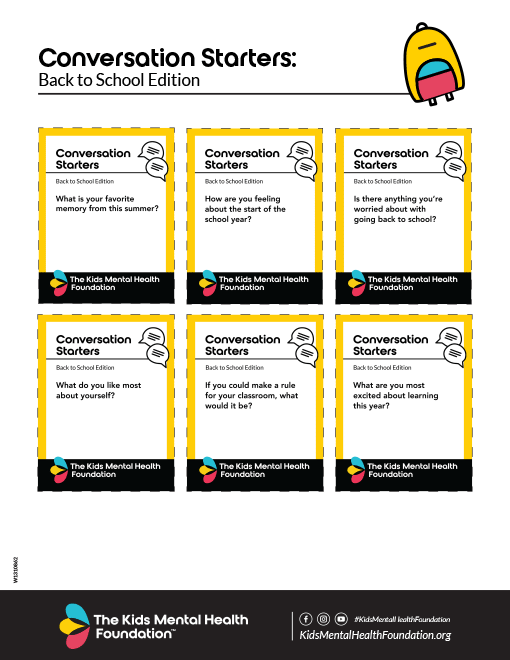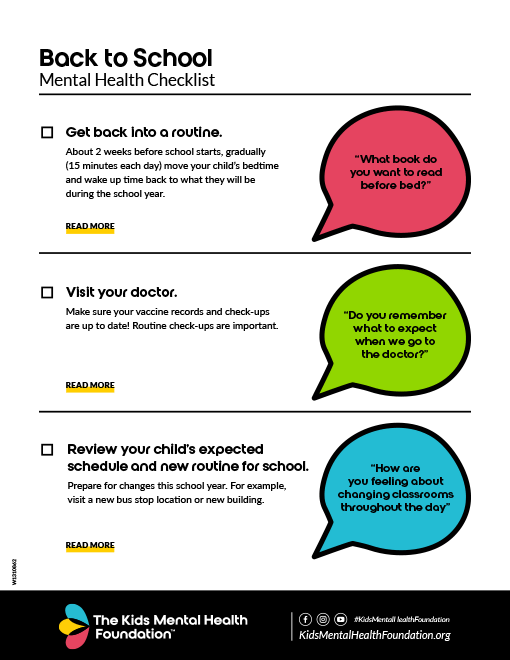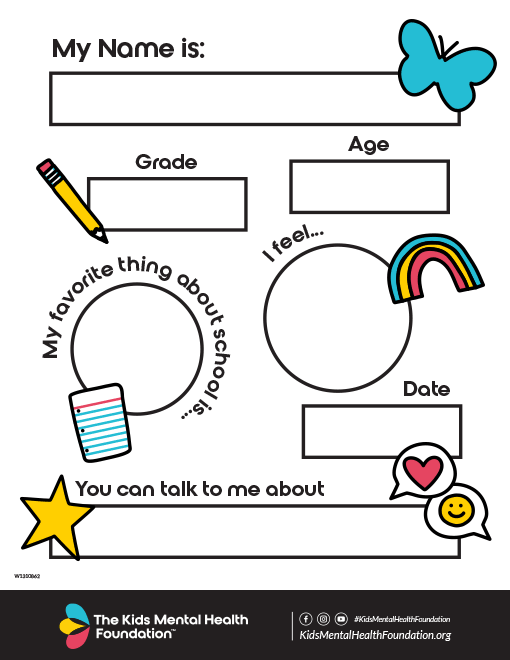- Getting to know your class and encouraging students to get to know one another can improve classroom belonging.
- Asking open-ended questions can be a great way to get everyone to share.
- While you can encourage all students to participate, try to avoid making a student answer a question they’re not comfortable with.
Back-to-School Mental Health Checklist
Article Summary
- Help your child prepare for school emotionally by reflecting on summer, talking about school-related feelings, and discussing upcoming changes. Our conversation starters can help get you started.
- Consider how your family can get organized for the school year by adjusting daily routines, setting up designated space for schoolwork and getting organized.
- When possible, meet teachers, attend school events and encourage extracurricular involvement.
Changing schedules. Supply lists. Forms to fill out. New teachers to meet. Many kids feel lots of emotions about their first day of school, as do parents and caregivers.
We’re here to help you get organized, reduce feelings of stress and make sure your child’s mental health is a priority this back-to-school season. Use our back-to-school checklist to make sure you and your child start the year off right.
Before the First Day
- Reflect on the summer and get excited about the upcoming school year. Then, talk to your child about school at a different time. Use the conversation starters below to help with both!
- Find a relaxed time when you can give your full attention, such as after dinner or at another quiet moment.
- Skip questions your kids don’t want to answer or don’t understand.
- Make sure not to force a discussion; stop asking questions if they don’t want to talk.
- If you have several children, you may want to find one-on-one time with each of them rather than trying to ask them all at once in a group.
- Talk about and practice any expected changes.
- Have a conversation about any changes that will happen this school year.
- If your child is meeting the bus in a new location, visit the bus stop with them a few times before the first day of school.
- For children starting middle or high school, visiting the school and practicing how to walk from one class to another may be helpful. Many schools have these visit days scheduled. Make sure to reach out and find out when they are!
- Sit down together and create a schedule for school days. Talk through expectations for mornings and after school. Once you agree on that, start using that schedule a few weeks before school starts to get into the habit.
- Sleep schedules are often different over the summer. About two weeks before school starts, gradually (for example, 15 minutes each day) move your child’s bedtime and wake-up time back to what they will be during the school year.
- Get organized.
- Designate a place for your child to work on homework, keep school materials, etc.
- Include your child in picking out supplies, choosing a spot and deciding where to put things away. This helps them learn organizational skills.
- Print the school calendar to help you plan ahead. Also, you can use it throughout the year to notice how it may be related to your child’s mood and emotional changes. For instance, you may notice that your child has increased anxiety at the end of the semester. If your child is anxious, see these tips to help them with their anxiety.
- Discuss expectations – yours and your child’s.
- Ask your child what their goals are for the school year. Help them create a plan and strategies for how to achieve those goals.
- Come up with a plan with your child of when and how to ask for help when they need it. This can be school staff or peers, depending on the child’s concern.
- Remind them of your rules and expectations. For example, is your rule that homework be done before screen time?
- Feeling connected to their school is positive for children’s mental health, according to the Centers for Disease Control and Prevention. You can support school connectedness by showing interest in their teachers and school activities. You can use our guide for connecting with schools.
- Meet their teachers at the start of the school year and talk about your child’s goals, strengths and areas of growth.
- Take note of school events for families and add them to your calendar. Showing up to events increases children’s feelings of support and connection to their school.
- Encourage your child to get involved in activities outside of schoolwork. Look at the school website together to see what clubs and sports are offered or meet with the school counselor.
On the first day, don't forget to set them up for success! Make sure they get enough sleep and the morning goes smoothly. Taking a few deep breaths with them before heading out the door can help calm everyone. This is helpful whether they are feeling really excited or nervous.
Get the rest of our Back-to-School Mental Health Checklist below. And use our Back-to-School Conversation Starters to find out what they’re thinking about the school year ahead. Plus, you can download a fun “First Day of School” sign you can fill out and have your child hold to capture first day of school memories.
 Copy Link
Copy Link






